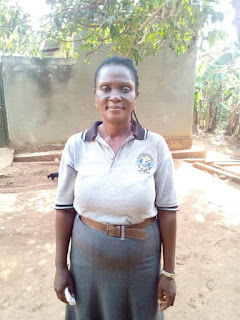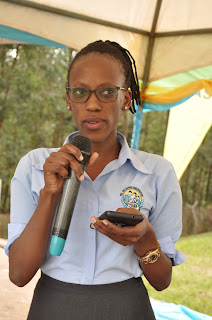When peer support becomes your life
 Barbara, an expert client from TASO Masindi, suspects she might
have contracted HIV around 1988 from her boyfriend at the time. She was a young
sheltered girl who was excited to have captured the attention of a rich older
man. Sadly, he had relationships with several other women one of whom had HIV.
It was said that he died due to excessive alcoholism, but she recalls that he
showed signs of wasting away and had a rash. By the time he died, they were
separated even though she bore him a son in 1989.
Barbara, an expert client from TASO Masindi, suspects she might
have contracted HIV around 1988 from her boyfriend at the time. She was a young
sheltered girl who was excited to have captured the attention of a rich older
man. Sadly, he had relationships with several other women one of whom had HIV.
It was said that he died due to excessive alcoholism, but she recalls that he
showed signs of wasting away and had a rash. By the time he died, they were
separated even though she bore him a son in 1989.
It wasn’t until 1990 that
she was tested for HIV in Jinja. After informing her that she was HIV positive,
the counselor informed her that she only had six months to live unless she
adhered to the guidelines she had given her. Prior to testing her parents had
sent her to tailoring school so that she could have a skill to take care of her
children. But the minute they found out that she was HIV positive, they
abandoned her and her children. In their words “She was a waste, after all she
was going to die”.
Barbara received care from a
mobile care home in Jinja until 1991 when TASO Jinja was opened. Her
registration number was 37. At TASO she received ongoing counseling, vitamins,
tea during break time and occasionally porridge to take home. She is grateful
that Jajja Noerine visited them regularly and encouraged them to keep fighting
until a solution was found. Those are the words that kept her going. There was
no Septrin prophylaxis or Antiretroviral Therapy at the time.
After a while she was depressed
and felt the need to hide from her neighbours who stigmatized her and her
family. She then went to live with her older sister in Nairobi. Her sister
had just gotten married but was willing to care for her and her children. While
in Nairobi Barbara fell sick, she went to a private clinic where she revealed
her HIV status so that they could give her appropriate care. At the clinic they
were happy to see someone openly declare their HIV status. They formed a
support group called Upendo where she
was invited to talk to and encourage others living with HIV.
In 2000, Barbara returned to
Uganda but went to live in Masindi where she joined the Philly Lutaaya
Initiative set up by AIDS Information Center. While there she was trained in
Public speaking and she continued to work with the HIV sensitisation teams in the communities.
She also volunteered with several other support groups such as NACWOLA and later Mama’s
Club which was formed in 2004.
When TASO finally opened its
doors in Masindi in 2005, Barbara was again one of its pioneer clients. With
her skills she became an expert client, she continued to share her story in
communities and support women who were too scared to disclose to their families.
Barbara had 3 children, all HIV negative, but unfortunately she lost two of them. Her surviving child
is doing well and is able to take care of her since she is nolonger engaged by TASO on full time basis. As an expert client, she continues to share her knowledge and experience
with the people around her in the hope that she is making a difference in their
lives.
We applaud her for sharing her story with us.

Comments
Post a Comment